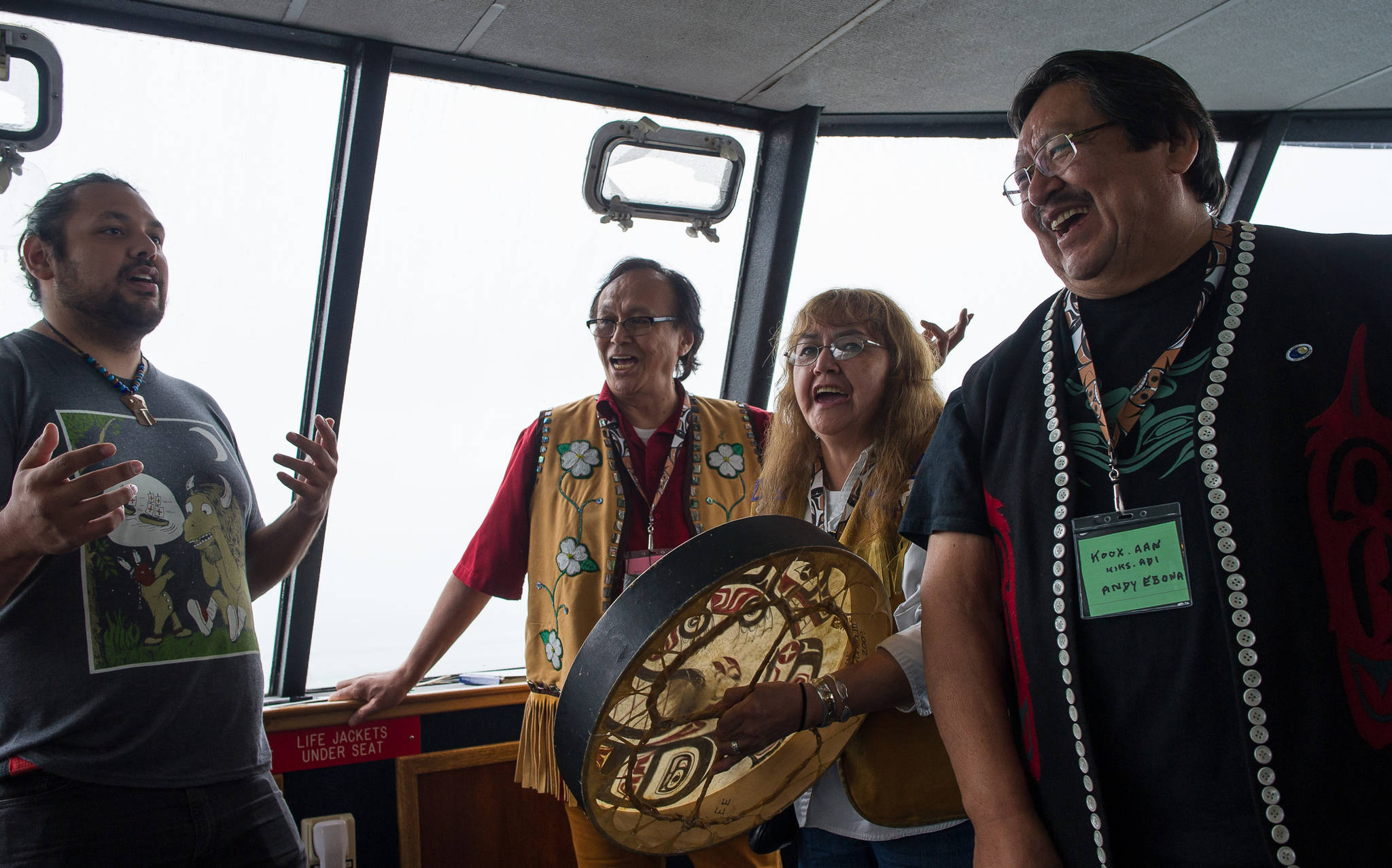David Katzeek took the microphone from Paul Marks and paused a moment.
Katzeek and Marks, both Tlingit elders, were tag-teaming a part of the Douglas Indian Association (DIA) Taku Inlet Business Cruise on Friday. Marks (who is the Vice President of the DIA Tribal Council) would speak in Tlingit for a moment, then Katzeek would translate in English.
Marks, his black and gray hair combed neatly back, finished a phrase and handed the microphone for Katzeek to translate.
“He said something that’s so profound,” Katzeek said, collecting himself. “What he said is, ‘Our ways are just as much alive right now as when they were being taught earlier in the history of our people.’”
Much of the third annual DIA Taku Inlet Business Cruise was dedicated to taking the history of the T’aaku Kwáan and A’akw Kwáan people and explaining why it’s still vital today. The cruise took the Allen Marine Catamaran M.V. St. Nicholas full of people to the Taku Inlet for a day-long excursion that included storytelling, sightseeing and plenty of food.
Prior to heading to the Taku Inlet, the boat stopped for a while near Douglas Island, next to Mayflower Island near Sandy Beach. Here, elders spoke about the uglier aspects of local history, including when the City of Douglas paved over the Douglas Island Cemetery in 1956 and when the city then burned down the Douglas Indian Village in 1962.
Those wounds run deep, but DIA has been working with the City and Borough of Juneau in recent years to begin to mend them. Numerous city officials were on the boat Friday, including City Manager Rorie Watt, Engineering Director Roger Healy, Community Development Director Rob Steedle and Lands Manager Greg Chaney.
Healy, Steedle and Watt are all on a committee that’s working with DIA to put a monument in place at the Gastineau Elementary School to serve as a reminder of the school being built on the burial ground. The design process for the monument is complete and Tribal Secretary Barbara Cadiente-Nelson said she expects the monument to be installed on site in either April or May 2018.
Healy, Steedle, Watt and Juneau Board of Education representatives were called to the front of the boat to discuss the memorial, and spoke to the gathered guests about the importance of learning from the past.
“It’s tragic,” Steedle said, “and I think it’s an opportunity to remember what was done and how far we need to come as people.”
Watt reflected on the renovation project on Gastineau Elementary in 2012 that accidentally unearthed graves. Watt said in an Empire article at the time that the city “had not at all expected to find anything there,” and said the same Friday. The memorial has been in the works since that discovery.
Bringing these past events to light is vital to moving forward, University of Alaska Southeast professor Dan Monteith said as the boat idled just next to Mayflower Island.
“Hopefully we can make this history a part of the history here that’s no longer repressed,” Monteith said, “no longer brushed over, no longer ignored.”
With events such as Friday’s trip to the Taku Inlet — which is the origin of the T’aaku Kwáan — the DIA hopes to ensure that local Native history remains alive. At the outset of the trip, Cadiente-Nelson read from the foreward to Elizabeth Nyman and Jeff Leer’s book “The Legacy of a Taku River Tlingit Clan.” The foreward, written by Robert Bringhurst, says there’s a mutual need between stories and the storyteller.
“Stories seek people out because they need people to tell them,” Bringhurst wrote. “We need people to tell them because they are maps of the world and they are concentrated summaries of reality. People who have no stories to tell, like stories who have no people to tell them, won’t survive.”
As the boat made its way through a thick fog that hung over the Taku River, Katzeek, Marks and others told stories ranging from early Tlingit research into tides to an ancient battle between two giants. There were also songs and dances, including one called “Wooshkeetan Love Song” as the ship passed by the back side of Douglas Island.
Tlingit elder Margaret Dutson spoke multiple times throughout the day, telling personal stories (such as living through two fires on Douglas) and fitting them into the larger context. Her voice was sometimes only barely audible over the boat’s engines, but her words stressed that history is vital to a people advancing both because it’s shared and personal.
“History is ours,” Dutson said at one point. “Every one of us has a history.”
• Contact reporter Alex McCarthy at alex.mccarthy@juneauempire.com.


